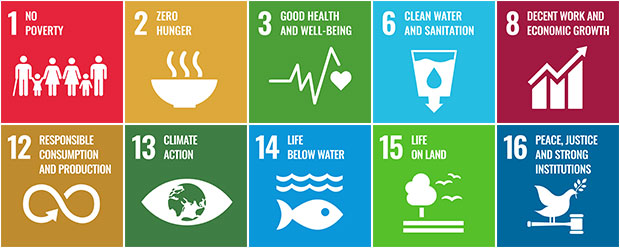CSR Procurement Guidelines
As of January 31, 2025
TOYOBO Group has established CSR procurement guidelines to support sustainable social development across the supply chain and contribute to the achievement of the SDGs.
When conducting transactions, we request that suppliers understand and comply with our CSR Procurement Guidelines. These guidelines, along with criteria such as management, quality, price, delivery, service, and technological development capabilities, are used to determine whether or not to do business with a supplier.
In addition, we will conduct a questionnaire to monitor the status of CSR initiatives and, as a result of the survey, we will request improvements from suppliers that have issues to address.
-
Promote CSR and engage proactively in social contributions.
- Respect stakeholders and contribute to the creation of a sound and sustainable society.
- Actively work on social contribution and community activities (such as environmental maintenance and improvement).
- Maintain and strengthen compliance (including legal compliance), fair trading, and corporate ethics.
- Conduct business fairly and impartially without violating social norms in corporate activities.
- Observe laws and regulations (such as the Antimonopoly Act,the Commercial Code,the Companies Act, Act on Promotion of Entrusted Small and Medium-sized Enterprises, the Act on the Protection of Personal Information, and the Foreign Exchange Act, etc.)
- Prohibit corruption and bribery of all stakeholders. (such as Illegal gifts, payments, consideration, provision of monetary or non-monetary benefits)
- Do not have a relationship with antisocial individuals or groups.
- Take measures to prevent and detect misconduct.
-
Maintain and strengthen environmental activities.
- Promote ongoing environmental protection activities (e.g. acquisition of ISO 14001).
- Strive for effective use of resources and energy savings such as improving the efficiency in the use of raw materials, water, and energy.
- Reduce emissions of pollutants into the air, water, and soil.
- Promote the three Rs for waste (Reduce: Reduce waste generation, Reuse: Reusing, Recycle: Recycling).
- Promote green procurement and green purchasing to reduce environmental impact.
- Strive to reduce greenhouse gas (CO2 and other gases) emissions, and mitigate climate change.
- Promote efforts to conserve biodiversity, including nature conservation.
-
Strive to ensure stable supply of products and guarantee quality and product safety.
- Promote quality assurance activities and continuous improvement (e.g. ISO 9001 certification).
- Comply with laws and regulations, strive to reduce potential risks, and ensure product safety.
- Assuming in advance situations and events that may occur in an emergency and developing a Business Continuity Plan (BCP).
-
Respect for human rights.
- Prohibit inhumane acts such as child labor, forced labor, corporal punishment, ill treatment, and human trafficking.
- Prohibit all forms of discrimination, including those based on gender, nationality, race, creed, age, disability, and LGBTQ+.
- Prevent harassment that harms the dignity of individuals (including sexual and power harassment).
- Protect the rights of foreign workers, including foreign apprentices, and provide a safe and secure working environment.
- Promote responsible procurement in response to the Conflict Minerals Regulation.
- Comply with the occupational health and safety laws and regulations of each country and region in which activities are conducted, pay attention to the health of employees, and through health and productivity management, ensure that occupational health and safety standards do not fall below the residential and health and safety standards of the country concerned, and strive to realize safe and comfortable workplaces.
- Try to reduce excessive working hours in accordance with the laws and regulations of the country or region in which the company operates.
- Pay wages in excess of the minimum wage in accordance with the laws and regulations of the country or region in which the company operates.
- Support and respect the right of workers to freedom of association in accordance with the laws and regulations of the country or region in which the company operates.
- Support and respect the right of workers to collective bargaining and other rights in accordance with the laws and regulations of the country or region in which the company operates.
- Animal experiments and other issues should be considered for the welfare of animals.
-
Disclose information to and have a dialogue with stakeholders in a timely and appropriate manner, and maintain and strengthen information security measures.
- Timely disclose product and service information, financial and non-financial information, and risk information.
- Appropriately manage confidential and personal information, and strive to prevent information leakage and loss.
- Respect the intellectual property rights of others and ensure thorough compliance with related laws and regulations so as not to unreasonably infringe such rights.
- Establishing a mechanism for resolving internal and external complaints and problems, including the establishment of a consultation service, as well as protecting those who report and consult with.
- To fulfill its social responsibility throughout the entire supply chain, the company will strive to communicate the items stipulated in these Guidelines also to business partners and request their compliance.







